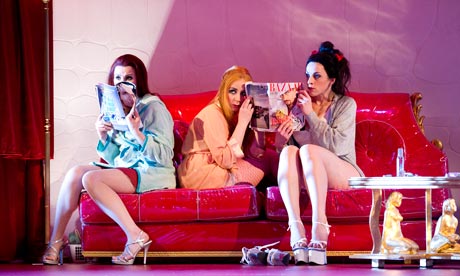
What is it with those opera types? Beneath their fancy garb and refined interval chitchat, their criticism turns out to be no more civil than the noisy opprobrium that fills football stadiums.
I'm referring to the ruckus at the Royal Opera House, where fans greeted a modern-dress (if dress is indeed the right word) staging of Dvorák's Rusalka with walkouts, jeering and, yes, booing. The opera retells a rather cloying little folk tale, so it probably didn't help that the directors set it in a brothel replete with warbling hookers.
Yet opera-goers have a loud and proud history of vocalising their displeasure. Back in 1875, they even booed Monsieur Bizet out of the theatre when he premiered that hum-along hit of his, Carmen. It's not that other genres of music are immune. The premiere of Stravinsky's ballet The Rite of Spring always leaps first to mind – boos yielding to fistfights and finally a full-blown riot. Then there's Britney, Rihanna, Lou Reed – all have been booed in the past 12 months. Still, it hasn't become a part of the culture in quite the same way.
Is it just that opera's fatal loves and losses and leaps make us behave – well, operatically? Does it have something to do with the giddying price of tickets? It's tempting to suggest that the higher the art form, the lower the manner in which an audience will express its discontent, but that would be failing to take stand-up comedy into account.
Aside from panto, which doesn't count, the only time I've ever booed is at a comedy club. It's not that I haven't wanted to boo, but like most, I tend to consume my culture as books or on a screen or through earphones. Marginalia, a snarky anonymous review on some movie site – they just don't cut it. Nor would vandalism in an art gallery. In the theatre, curtain calls offer more scope for a full-lunged expression of displeasure, though the rarity of appearances by directors and writers mean you risk misdirecting your scorn.
Let's be clear – booing is not pleasant, and having once shared a stage with a booed poet, I know as much as I want to about that. And yet booing is also a sign of caring, honest: it's a sign of direct and passionate engagement that returns us to art's roots.
The practice of booing performers stretches back to ancient Greece, where tragedians competed annually at the Dionysia festival. Eventually, audience participation became a civic duty. Booing was also part of life – and death – in ancient Rome's gladiatorial games, whose audiences helped determine a competitor's fate.
As that poet acquaintance of mine will tell you, art is, in its way, a blood sport. Likewise, it's our responsibility as an audience to appraise, not merely soak up. Applause must be earned. An appropriately placed boo can be a rebellion against some of the more waffly ideas circulating in the cultural scene – the notion that any book which gets people reading is a good thing, for instance, or Brit Art's shoulder-shrugging claim that the artist's sole responsibility is to get a response, no matter what.
Though this is a newspaper column and makes zero claims to be anything approaching art, I encourage you to treat it as practice. Rather than anonymously hitting the comment section, take a deep breath and bellow your boo out loud.

